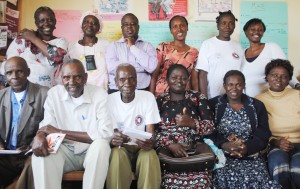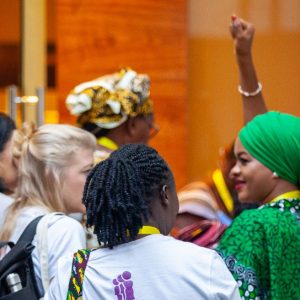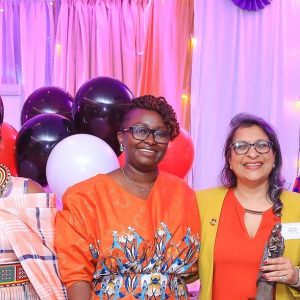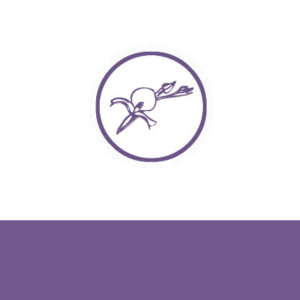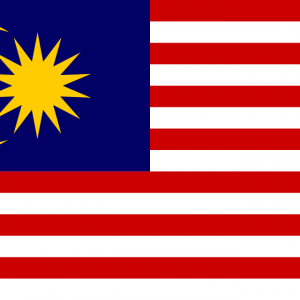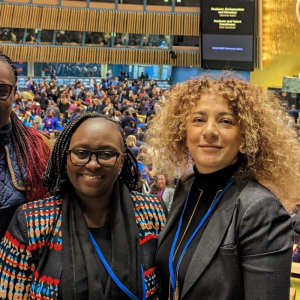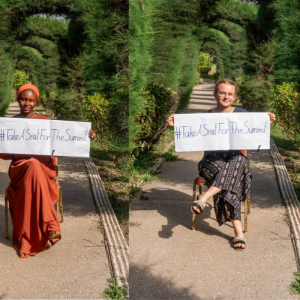During our partner visit with Feed the Minds to ECAW in Kuria in July, we had the chance to spend a day with some of ECAW’s team of paralegals. ECAW work with 25 people who feel passionately enough about human rights, girls’ education and ending FGC to give of their time freely as volunteer paralegals (community outreach workers) in the Kuria area. We met 11 of them during a session at ECAW’s office in Kehancha. Some of the paralegals have been working with ECAW for a long time, while others are fairly new to the work. All of them share a belief in ending FGC. Here we introduce a few of the unsung heroes of the movement to end female genital cutting.
Samuel Gesaka, Kuria East
Samuel Gesaka
Gesaka is an elderly male paralegal who, having left the Kuria community and seen other communities prospering, wants Kuria to adopt and change for the better. He is a recent recruit to the paralegal team, having joined since January 2015. He is “not educated but smart” and wants to work together to end female genital cutting (FGC) and so works with the Clan of Elders to address the issue.
Gesaka is the spokesperson for the elderly male paralegals relied upon by ECAW to approach the Clan of Elders, a group which many of the community fear. In June, along with the two other elderly paralegals, Gesaka convened a workshop with the Elders in Kegonga where he stated that he wants FGC to end as other practices have because Kuria is being left behind. He advised the Elders to attend seminars and learn of Kenya’s development, the fact that FGC has no benefit and about the need for education of girls (and the need for the moral support of the community). He feels that the group was somewhat receptive as they requested to fill in an attendance form and allowed a photograph to be taken.
Gesaka also undertakes personal initiatives outside of that supported by ECAW to engage the clan in conversations, and reports the results of these back to ECAW. Gesaka enjoys using the Sustained Dialogue and Family Unity Model posters in his facilitation, using it with the Clan of Elders and also in schools, churches and with Chiefs who have requested their own, and records all of his activities in a log book.
The Clan of Elders can be a challenging group when raising FGC as a direct issue and have shouted at Gesaka but he does not fear them and they do calm down and listen. Gesaka has advised the Elders to develop a saving circle whereby they can save money between them in order to no longer rely on money from cutters and to enable them to obtain larger loans to support community development activities.
Margaret Chacha, Chinato
Margaret Chacha
Margaret has been working with ECAW for over two years. Orchid Project and FTM also met with Margaret in (see previous Paralegal Profiles). She sees paralegals as important role models. She held training and a meeting in December with many people from the area, including chiefs and religious leaders. “In our area, most of the girls did not go for the cut as understanding of the practice is increasing”. She uses the posters presented to her by ECAW in April at community gatherings, in churches, in schools and at funerals.
Margaret works with women’s groups and invites men to these as otherwise they do not receive the same knowledge and it is vital for them to understand since often they are a driver for girls to be cut, e.g. by saying that uncut girls smell. Margaret was involved in the Chinato Girls’ Empowerment Programme in April which saw 100 girls attend and was additionally facilitated by a pastor, a nurse and a teacher. The number of girls and their requests for transport allowance was a challenge. Another challenge is reaching those in the interior due to distances faced and requests for transport allowance.
Coletha Siruri, Kegonga (Maeta division)
Coletha M Siruri presenting at her forum
Coletha is the lead paralegal for Kegonga, and has been working with ECAW for eight years, raising awareness of FGC in barazas and churches. She say: “There will be a time when community members will agree and abandon FGC, my neighbours no longer cut their daughters.” Since we last saw her in January 2015, she has been working in different areas with girls and other stakeholders. In February, she held a meeting at the District Commissioner’s office during which she addressed women’s issues, education and hygiene, incorporating FGC. She feels that those in the interior, many of whom are elderly, find it hard to accept change, whilst many young women look to her to support them in not cutting their girls.
Coletha stresses that this is not one person’s initiative and that we need to work together. She directs parents where to obtain bursaries to support their girls through school. The youth and young men have been asking Coletha why they are left out, she has been including them in activities. Coletha held a meeting in Kegonga district hospital with Gesaka where nurses agreed to raise the issue of FGC in clinic sessions with young mothers. She has also gained the support of a young male health professional who has married an uncut women and will not cut his girls. The main challenge Coletha faces is expectations of transport reimbursement from the community who often stop attending sessions when they realise they will be given nothing. Another challenge is that faced by widows who find it difficult to support their girls to attend school.
While we were visiting ECAW, Coletha organised a forum in her community. About 80 people attended, and she had also arranged for traditional music and dancing, which engaged everyone present and got us all up and dancing. She also gave a platform to a nascent group of youth leaders, several of whom were young men who stood up and talked about FGC, education and human rights.

